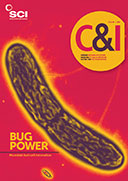Frost &Sullivan estimates the global market for industrial wastewater treatment technology at $26bn in 2016 - growing at around 5.8%/year. However, clean water technologies currently used by industry – filtration using adsorbents such as activated carbon and chemical oxidation – are energy intensive and expensive. And they don’t get rid of certain so-called ‘micropollutants’, such as organohalogens, which though present in ppm are bioaccumulative and can therefore build up to toxic levels in the environment and in humans.
That ‘presents us with a great opportunity to use synthetic biology,’ says Ben Reeve, Chief Technology Officer at CustoMem. The Imperial College London spinout is using synthetic biology looks to design and develop a cost-effective, advanced filter technology for waste water treatment in the chemicals industry.
Reeve and his team use Acetobacter, which naturally make huge amounts of ‘bacterial cellulose’ as they grow and use the polymer to form a protective coating around the cells. ‘We first had to develop the necessary synthetic biology toolkit – vectors, promoters and regulators – to genetically modify Acetobacter,’ he explains. ‘Secondly, we had to identify the genes from databases responsible for producing the cellulose and then, using computer aided design, build new DNA constructs for testing our modifications. We were then able to modify the bacteria so the polymers they produced had added chemical functionality, which allows [them] to bind strongly to the micropollutants.’
CustoMem processes the resulting polymer gel into hard porous granules that can be used to replace activated carbon in a water treatment tank. By changing the surface pH of these materials, using an acid or alkali and a salt wash, Reeve says they can release the pollutants and reuse the material. In tests, researchers were able to reuse the polymer granules up to five times before seeing any sign of degradation.
CustoMem already has a prototype product, which is currently being tested with water samples from a European chemicals manufacturer. Within the next two years Reeve expects the product to be with partner customers, with full commercial roll-out from around 2020.





